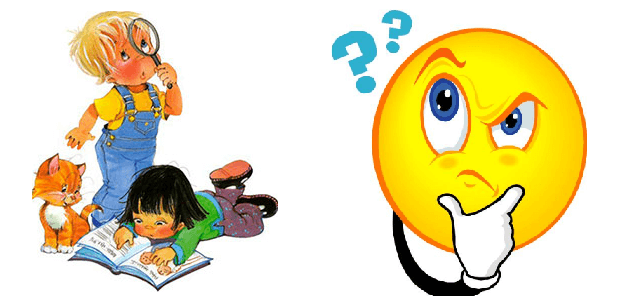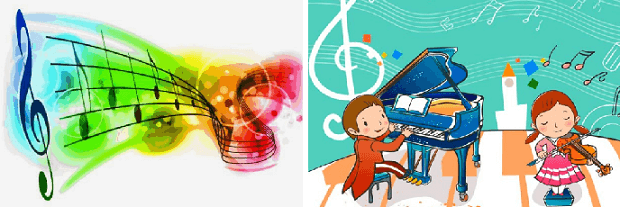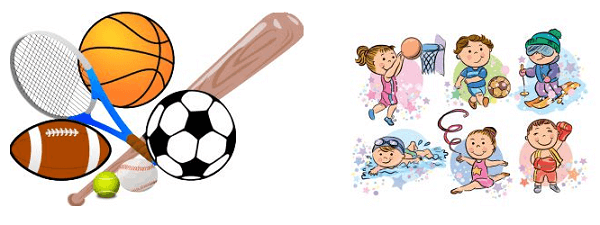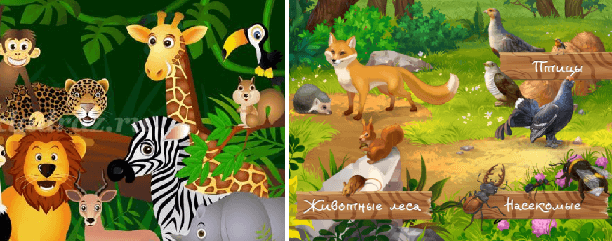Equipment:
Artistic design of the game room;
Poems and riddles on a given topic;
Demo games;
Interesting jokes.
Conduct form: holiday quiz with entertainment program.
I. Preparation of the event
1. Previous work of the team. Roles are assigned.
2. Planning. Discussion of the quiz scenario.
3. Preparing a quiz: decorating the game room.
II. Event plan:
1. Introduction. Team formation.
2. Journey through the country of humor: riddles, relay races, competitions.
3. Final part.
III. Scenario.
Children are divided into two teams, call alternately their name and motto.
First, a little warm-up.
Competition I "Draw me"
Now team members will blindly draw their captains. We need 5 participants from each team who will draw: head, torso, arms, legs, decorations. And we will actively cheer for our team!
On the posted letters of paper, children draw blindfolded their captain, other participants cheer for their team. The drawings are posted next to the scores of the teams.
Competition II "Guess"
There are four branches on a birch, on each branch there are three more branches, on each of these branches there are eight apples. How many apples are there? (not at all)
What is not in a women's handbag? (order)
The little mouse and the little rat simultaneously began to run towards the piece of cheese. Who will get to it faster? (mouse because it's on a bike)
How to find out who is in the refrigerator: a mouse or a rat? (on the bike in front of the refrigerator)
Which of them will quickly get into the apartment through the window? (rat cub, because the bike will get stuck in the window)
How many neck vertebrae does a giraffe have? (7)
A task for the ability to count: a trolleybus was driving. There were 6 people in it. At the bus stop 2 got off, 4 got on; on the next 3 came out, 8 came in; on the next 5 came out, 2 came in; on the next 2 came out, 12 came in; on the next 5 came out, 4 came in; on the next 2 came out, 8 came in; 3 came out on the next one, 4 went in. How many stops were there? (7)
Competition III "Show-off"
Team captains should show their teams the following things:
sun month
crocodile monkey
School emergency room
mausoleum prick
Computer hassle
pineapple fright
Loving couple lizard
injustice bore
Competition IV "Make up a story"
Two teams are invited to come up with short funny stories with the words “crow, bicycle” and “brownie, refrigerator”. A witty and connected story gets the highest scores.
Competition V "Balloons"
Two participants are selected from two teams, who must burst a balloon with their hands tied, pressing it together.
Competition VI "Sit down!"
Team members are invited to create a certain facial expression (for example, an image or surprise) and sit down ten times, keeping this expression on their faces and not laughing. More points are awarded to the team whose participant crouched in this way more times.
Competition VII "Who will eat a lemon faster?"
Participants from the teams are invited to first eat an apple at speed, then a lemon. Points are awarded based on the time used.
Competition VIII "Kolobok"
Two teams are invited to stage the folk tale "Gingerbread Man" in the form of: 1) melodrama; 2) militant; 3) comedies; 4) advertising block.
Winners are determined, teams are awarded, children share their impressions.
IV. Analysis of the event, conclusions.
1. The goals and objectives that were set were solved. The content of the event took into account the needs of children, their age-old characteristics, interests and creative imagination.
2. The preparation process covered all stages.
3. Holding an event.
Organization: the premises were decorated; clarity, coherence; rational use of time.
Methodology: the age-old characteristics of children were taken into account; creative activity of children.
Psychological situation: there was a high activity of children, interest, psychological comfort.
4. Results: the goal was achieved.
Сhudesenka.ru
Anna Gladkova
Quiz for minors 14-18 years old "Through the pages of your favorite books"
State government institution
social services of the Krasnodar Territory
"Otradnensky Social Rehabilitation Center for minors»
Subject: "By pages of favorite books»
Conduct form: quiz.
The target audience: minors 14-18 years old.
Form and working methods: quiz, exercise "Greetings", talk on the topic.
Target book is a source of knowledge.
Tasks:
Involve children in books
Nurture a feeling compassion for heroes
book and treat her with care.
Expected Result: expand knowledge juveniles about some fairy tales.
Equipment: books.
Plan:
5. Introduction: greeting, exercise "Greetings".
6. Beginning of the lesson: talk on the topic.
7. Main body: holding quiz.
8. Final part: reflection, summing up, reading a poem.
Quiz"By pages of favorite books»
Target: promote understanding of what book is a source of knowledge.
Tasks:
To develop the cognitive interest of children;
Correction of partnership skills, analytical thinking, basic emotions, interest;
Involve children in books for the development of cognitive, creative and emotional activity;
reveal children's knowledge about fairy tales;
Nurture a feeling compassion for heroes to consolidate the ability to listen carefully, answer questions, briefly convey the content of the works;
Cultivate a desire to communicate with book and treat her with care.
Course progress.
Beginning of the lesson.
Greetings.
Exercise "Greeting"
Purpose of the exercise: warm-up, greeting the participants to each other.
Participants are invited to form a circle and divide into three equal parts: "Europeans", "Japanese" and "Africans". Then each of the participants goes in a circle and greets everyone "in their own way": "Europeans" shake hands, "Japanese" bow, "Africans" rub their noses.
Introductory part.
caregiver: today, guys, we will make a trip to pages of your favorite books. Somebody likes to read fairy tales, someone fantasy and adventure, and someone animal books. We will visit your favorite characters. So, sit down comfortably, we're off.
Main part.
I.competition "Fabulous workout"
Name a fairy tale character who is out of his skin (Princess Frog)
What is the name of the aircraft on which a woman first took to the air? (broom, mortar)
What is the name of the fairy tale, which tells the story of the long journey of a bakery product to the consumer? (kolobok)
Remember the storyteller who had his own horse? (P. Ershov)
What is the most reliable means in fairy tales that replaces the compass by which one finds the way? (clew)
What is the name of the fabulous table on which delicious food appears? (tablecloth self-assembly)
Name the fairy-tale character who burst at the sight of an unskilled built bridge. (bubble)
In which Russian folk tale describes the life of a large communal apartment. (Teremok)
What initial product is needed for cooking fabulous cabbage soup and porridge? (axe)
What is the name of the king who lived so long ago that no one believes in it? (peas)
Which king had income from nutshells? (Dodon)
What are the parts called? women's dress in which objects are placed. (sleeves)
II. Contest "Who is bigger"
Word on the card "WORK". What words can be formed from this word.
III. Competition Complete the name of a literary hero»
Dad--- (carlo)
Brownie --- (kuzya)
Postman--- (Pechkin)
Signor--- (tomato)
Dwarf--- (nose)
Princess --- (swan)
Iron--- (woodcutter)
Old man--- (hotabych)
A bull is walking, swinging
Sighs on the go
Oh, the board is swaying
Now I will fall (4) Agniya Barto
Which of the writers made the onion boy the main character (2 (Rodari)
To whom I owe the birth of the village of Styopa (6) (S. Mikhalkov)
Who wrote the fairy tale Thumbelina 7 (1) (G. H. Andersen)
5. Heroes of this writer loved to fantasize. That's what they were called - dreamers? (3) (I. Nosov)
6. Which of these writers is called Samuel? (5) (Marshak)
7. Which writer has animals talking on the phone? (Chukovsky)
8. Who came up with the theme, Cheburashka, friends from Prostokvashino? (8) (Uspensky)
1. Andersen 4. Barto
2. Rodari 5. Smarshak
3. N. Nosov 6. S. Mikhalkov
7. Chukovsky 8. Uspensky.
V. Competition "Fans"
1. Sing a kolobok song.
2. Sing the song of the Goat, which she sang to the goats.
3. Call Sivka - Burka.
4. Call sister Alyonushka.
VI. Competition “Insert the missing word into the text of the fairy tale.
Balda lives in the priest's house, Sleeps on ___ (straw) Eats for ___ (four) Working for ___ (seven). Until he brought everything dancing with him, the horse will be harnessed. will plow the strip. The furnace will be fired up, everything will be prepared, purchased. Popodya Balda does not praise Popovna about Balda, she only mourns. Poppyok calls him ___ (uncle) He will make porridge, babysit his uncle.
Only pop one Baldu___ (Not loves) Never ___ (sip)
He often thinks about retribution;
Time is running out and the deadline is ___ (close)
Pop it in advance ___ (crackling)
VII. Contest "Captains"
How would you console fairy tale characters in such situations.
A) grandfather - after they pulled out a turnip, and it turned out to be rotten.
B) a wolf with its tail torn off after being beaten because of a fox.
C) a hare after the rooster drove the fox out of the hut, and a lot of garbage and dirt remained in the hut.
D) the girl Zhenya, who had all the petals are wasted"Tsvetika-semitsvetika"
VIII. Contest "Cat house"
Each team has 1 person. Spectators shout: Tili bom, tili bom, the cat's house caught fire - the participants wear clothes prepared on chairs, who is faster.
IX. Contest. Guess and draw
Magic items in fairy tales there are:
Come on, try and you are my friend
Collect magic items box.
I remember, don't yawn
Invent this item.
Exactly seven petals
There are no more colorful flowers
Tear off the petal
He will fly to the east
And north and south
And he will return to us suddenly.
You make a wish
Fulfillment expect
What is this flower
Buttercup? lily of the valley? light?
Many miles ahead
How would you get through them faster?
You try their way
You will overcome the path in no time.
If you put it on
You can go anywhere
And yet unacceptable
Can't find you in it.
Grandma baked grandfather
Grandpa didn't have lunch
The boy ran into the forest
Got on the toe of the fox.
X. Competition "Who is faster"
Which of the literary heroes spent 28 years on a desert island? (Robinson Crusoe)
Fidget shorty from Flower City? (Dunno)
In which work did S. Mikhalkov talk about a man of enormous stature? (Uncle Styopa)
toy protagonist books who was given a very funny name because he fell off the table? (Cheburashka)
In which story does a girl go to pick flowers in winter? (12 months)
The heir of three fat men? (tutti)
A queen with a cold heart? (The Snow Queen)
Fairy kidnappers? (Swan geese)
Who went from ugly to handsome? (Ugly duck)
What was the name of the bride who ran away from the blind and greedy groom? (Thumbelina)
Dad who took shavings from his son (father Carlo)
The wolf's tail served as a bell-lace (Eeyore)
A veterinarian who visited Africa? (Aibolit)
Fairy tale, where do they lose shoes? (Cinderella)
What are the fairy tales in which the inhabitant of the river fulfills all the whims of the protagonist? ( "By the Pike's Command", tales of a fisherman and a fish.
4. Final part.
Here our journey ends "By pages of favorite books» We are used to book, we rarely think of it as a wonderful treasure and it happens that we do not always appreciate and protect it.
But think about it. After all book is a reliable means of transferring knowledge from generation to generation. Books not only acquaint us with the past, but also allow us to understand the present and. Like wings, carry us into the future. This is the only "Time Machine" with which you can make exciting trips, book- allows you to visit any part of the globe, get acquainted with the life of wonderful people.
Comes book for any home.
touch her pages-
She will talk to you
About the life of animals and birds.
You will see the floods of the rivers,
You will hear horse clatter.
Chuk and Gek will come to you
Timur and Uncle Styopa.
Well, when it suddenly gets sad,
Don't get too upset:
Like the best, true friend.
The book will dispel boredom.
Summarizing.
Announcement of winners.
All kids love to solve riddles, but when they become schoolchildren, especially from the age of 10, they are no longer interested in simple riddles. To captivate children, they must be packaged in a new form that involves a competitive element.
Intellectual questions are an integral part of competitions and quizzes that are held on birthdays and other children's holidays, at class events and school lessons. A quiz is a list of prepared questions with answers known only to the facilitator, united by a theme or a certain principle, and with prizes for the winners.
Quizzes for children 10-13 years old with questions and answers are developed on a variety of topics - sports, literature, fairy tales, in Russian or mathematics, about animals or plants. Main principle choosing a topic - it should already be familiar to the guys. Questions for a quiz can be combined not only by topic, but also by the principle of their construction.
For example, to competitions at school for holding theme week in the Russian language, the questions will be intellectual, to test knowledge. And for a birthday, the questions in the quiz will be funny, such riddles with a catch, because this is a holiday, not a lesson.
![]()
Quizzes for schoolchildren can also be different in form. In absentia, when everyone gets acquainted with the list of questions in advance and the children have time to find answers to submit them to the competition. Such a quiz involves rather complex questions on a topic that requires participants to have information search skills.
But the prizes in such a quiz should be serious enough to interest the participants. These quizzes require written answers. If a complex intellectual quiz is conducted without pre-training, it can offer alphabetical answer options, from which the participant needs to choose the correct answer.
Oral quizzes always include an element of competition. They can be held in the form of a competition, where each participant plays for himself, demonstrating intelligence and ingenuity. Or the quiz may be part of a competition for teams, where answers are given collectively or by a representative of the team.
Today's quiz, thanks to accessibility information technologies, can be packaged in the shell of popular TV games, for example, "Own Game" or "Brain Ring", but in any case, the main thing is skillfully chosen questions. That is what we offer you.
Educational cartoons - Quiz for kids

An intellectual quiz for schoolchildren aged 10-13 is unlikely to be appropriate for a child’s birthday, but erudite contests are often used at school holidays. In order for it not to turn into a boring lesson, when preparing it, you need to take into account several things.
- The topics chosen should be familiar to the children.
- The complexity of the questions must be carefully calculated. Questions should be of varying difficulty levels, but should not include any age-appropriate participants.
- Intellectual questions that require knowledge should replace riddles with a trick, the answers to which require ingenuity and a sense of humor.
- Requires careful thought game design. For example, simple questions on knowledge of the topic are performed at speed. Difficult questions can be offered with ready-made answers, where you need to choose the correct one from the options provided, etc.
Music Quiz

A musical quiz for children from 10 years old requires a little more support from the organizers than simple riddle contests, because you need to provide its musical accompaniment.
Musical quizzes can be intellectual, requiring children to show their knowledge of musical terms and instruments, the names of composers and titles of musical works. For children from 10 to 13 years old, in this case it is better to lead them through musical fairy tales or works related to fairy tale characters. Such contests include both verbal questions and listening to musical excerpts for 3-5 minutes.
A musical quiz held for children on a birthday or holiday will, of course, be completely different in terms of the chosen topic and the level of difficulty of the questions. It should include riddles with a catch about musical instruments, for example, and excerpts from songs that children love, which they will have to learn.
If they have to sing the answers, it will only add to the fun and allow the guys to show their talents. Such contests create a special festive mood for any birthday. At the same time, they develop an ear for music and introduce children to musical culture.
Ecological quiz

2017 has been declared the Year of Ecology in Russia, which means that environmental quizzes will be especially in demand. Environmental competitions may include questions:
- About animals, fish, insects and plants.
- ABOUT natural phenomena(rain, fog) and objects (mountains, sea, etc.).
- On literary works devoted to nature.
- On substances and objects harmful to nature.
- About the correct behavior of the child in nature and much more.
For children 8-10 years old, an ecological quiz may include questions about animal tales, humorous in form, but with serious answers. Some of these funny questions may also be included in contests for the child's birthday.
Who is this?
A quiz can include tasks of the same type. For example, according to the description of a person, a literary character, an animal, participants need to give answers to the question “Who is this?”. This may be a passage describing the character or questions in the form funny riddles with a trick. The main thing for children 10-13 years old is to choose the right characters for tasks so that they can recognize them and give answers.
Sport
 Sport is not only dexterity, strength, speed, but also knowledge about this side of human life. Many schoolchildren aged 10-13 already attend sports sections and are seriously passionate about various types sports. To check how well they know the sport, a quiz on this topic will help. Questions about sports may include:
Sport is not only dexterity, strength, speed, but also knowledge about this side of human life. Many schoolchildren aged 10-13 already attend sports sections and are seriously passionate about various types sports. To check how well they know the sport, a quiz on this topic will help. Questions about sports may include:
- (ball, rope, etc.).
- Tasks of the “Who is this” type are serious about famous athletes or comic about characters from fairy tales and stories who excelled in running, jumping, etc.
- Competitions for scholars on knowledge of sports rules or the history of sports.
- About numbers related to sports. For example, the number of Olympic rings, the number of players on a football team, etc.
Of course, questions on the knowledge of sports and athletes for children 10 years old should not be too difficult. If the quiz questions are supplemented with fun sports competitions, I believe that we will get a real holiday program - "Funny Starts" or a birthday.
Animals

The theme of animals in popularity for quizzes can probably compete only with fairy tales. Children, including 10-12 years old, already know a lot about animals, and it will not be difficult for them to give answers to questions about them.
And the compilers of the quiz can find the most different materials on this topic - and poetic riddles about animals, and Interesting Facts, films, cartoons about them. All this will allow you to turn the quiz, if you wish, by adding, for example, drawing and other contests, into a full-fledged holiday, celebrating Bird Day, Cat Day or Tiger Day, which are on the calendar.
Fairy tales

Fairy tale quizzes are held for the most different ages- from preschool children to pensioners, as everyone knows and loves fairy tales. It's just that questions for such different age categories are also compiled in different ways. For kids, seriously testing their knowledge, and for older ones there will be trick questions.
For children 10 - 13 years old, serious questions are chosen for the quiz on author's fairy tales and funny questions on Russian folklore. Such competitions awaken a love for the Russian language and reading, and the opportunity to feel like an erudite, giving the right answers, brings joy to the child both at school and on his birthday.
Fairy tale quiz



